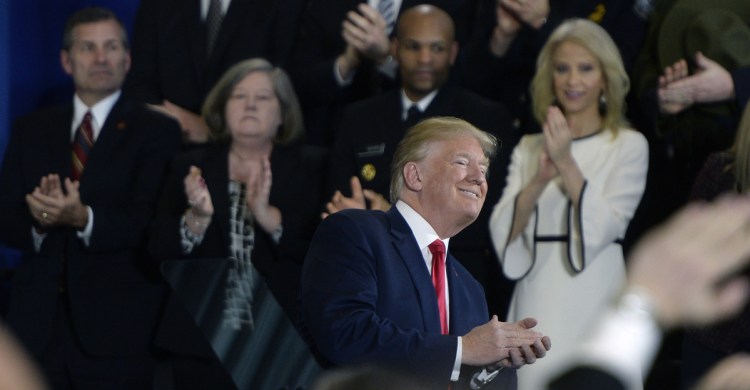As long as he’s not the one being investigated, President Trump appears to be a big believer in law enforcement.
Most of his address on the opioid overdose epidemic Monday in Manchester, New Hampshire, offered tougher laws and harsher punishments to end the “scourge” that kills an average of 115 Americans every day.
The solution, he said, requires building a wall on the Mexican border to keep drugs out, and imposing economic penalties for “sanctuary cities” unless they use municipal resources to hunt down undocumented immigrants.
For drug dealers, Trump said, he favors the death penalty. He spoke glowingly about countries that execute drug dealers because they have “zero tolerance” and “don’t play games.”
He didn’t say which countries, but it was a good description of the policy favored by brutal dictator Rodrigo Duterte of the Philippines, someone Trump has complimented in the past.
“I love tough guys,” the president called to the invitation-only crowd. “We need more tough guys!”
CAN’T ARREST OUR WAY OUT
But if the president would listen to some of the real tough guys on local police forces in Maine and elsewhere, he would likely hear that he’s on the wrong track.
They have told us time and again that they cannot arrest their way out of this problem, and that law enforcement alone won’t work.
Prescription painkillers, either made here or legally imported, are what started the epidemic and are still involved in nearly two-thirds of the overdose deaths. A border wall would not keep these painkillers out.
In addition, given that immigrants are less likely to commit crimes than native-born Americans, turning local police departments into enforcement agencies that crack down on minority communities instead of protecting them would be, among other things, a colossal waste of time.
And the death penalty may sound tough, but it would mean very little to someone already facing decades in prison for major drug offenses. It might be a deterrent if every drug dealer expected to be caught, but they don’t – and you can see why.
The police cannot watch everyone all the time, and drug deals are going to occur as long as there is a demand for drugs.
Trump briefly mentioned some changes he’s proposing to reduce demand, including allowing Medicaid to be an eligible payer in more drug treatment facilities, and an unspecified amount to be spent on developing a non-addictive painkiller.
WHAT’S NEEDED IS NO SECRET
But six years into the epidemic, we should know what to do.
It’s not a question of whether it’s a supply problem for law enforcement or a demand problem for the medical community. It’s both.
If this were an infectious disease, we wouldn’t be arguing about whether to find the source of the virus or to treat the people who are infected. The gold standard for opioid addiction treatment is medication-assisted treatment, using drugs such as methadone or Suboxone.
Too many people who want treatment can’t get it because they don’t have health insurance and can’t afford to pay the out-of-pocket costs.
So, it’s fine if the federal government tries to scare kids straight with Trump-touted “great commercials” or scare drug dealers into retirement with a new death penalty law, but it should focus first on what has been proven to work.
If the president wants to stop the carnage, treatment is where he needs to start.
Send questions/comments to the editors.



Comments are no longer available on this story